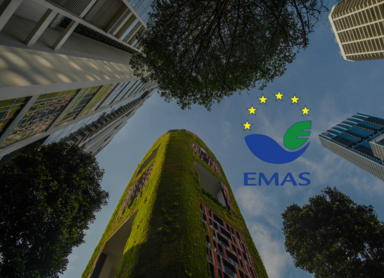EMAS – A Complete Guide to Environmental Certification
Companies and government agencies are increasingly requiring their partners to demonstrate proper care for the environment. Entrepreneurs who want to show they are consciously and responsibly taking the green path—and avoid accusations of greenwashing—may choose to implement the EMAS certification. But what exactly is EMAS and what benefits does it offer?
EMAS – What Is It and What Are Its Main Objectives?
The acronym EMAS stands for Eco-Management and Audit Scheme, a voluntary system for assessing the effectiveness of environmental management, which can be implemented by any organization. EMAS was developed in 1993 by the European Commission and operates based on the well-known Deming Cycle, which emphasizes continuous monitoring and improvement of processes. The functioning principles of EMAS are detailed in Regulation (EC) No 1221/20091 of the European Parliament and of the Council.
The main goal of EMAS is to help create an action plan for sustainable consumption and production as well as sustainable industrial policy. This goal can be achieved by implementing environmental management systems that are systematically, objectively, and periodically evaluated by independent auditors. Once the formal requirements are met, a company is added to the EMAS Register2, an official list of entities that have implemented pro-environmental procedures. Currently, this list includes just over 4,000 entities.
EMAS Certification – How to Obtain It and What Are the Requirements?
To implement EMAS, an organization must meet the requirements set out in Article 4 of the Regulation. The process involves several steps:
-
Conducting a comprehensive environmental review within the organization, as detailed in Annexes I and II of the regulation.
-
Implementing an environmental management system and best practices, if applicable to the organization.
-
Undergoing verification by an accredited EMAS verifier.
-
Preparing an environmental statement.
Once these conditions are met, the organization can apply for registration with the relevant authority. In Poland, this is the General Director for Environmental Protection (GDOŚ).
How Long Is EMAS Certification Valid?
EMAS certification is valid for three years. After that period, the entire environmental system, audit program, and its implementation must be re-evaluated. Updated documentation must be submitted again to GDOŚ. The regulation offers simplified procedures for small enterprises, including an extended certification period, provided that the verifier does not identify any environmental risks.
Additionally, an environmental review must be conducted every time the organization plans changes that may affect environmental or human health aspects. This includes changes in operations, structure, administration, activities, products, or services. For example, if your company introduces a new production technology or plans to install solar panels, compliance must be verified.
EMAS vs. Other Environmental Certifications – What’s the Difference?
The EMAS standard includes the requirements of ISO 14001. Companies that implement EMAS automatically meet ISO 14001 requirements. However, the EU guidelines are not the only environmental protocol available to businesses. Other certifications include:
-
Positive Luxury – geared toward luxury brands, requiring high ethical standards in areas such as governance, employment, environment, and innovation.
-
1% For The Planet – for companies that commit 1% of their global turnover to environmental causes.
-
B Corp – awarded to companies that ensure high standards of environmental and business management.
These are just a few of many green certifications. Others include The Green Business Bureau, Leaping Bunny, and Rainforest Alliance Certified. Not every certification is suitable for every company—it depends on your industry, organizational structure, and employment policies.
What Are the Benefits of EMAS Certification for Companies?
According to the website of the General Directorate for Environmental Protection3, registering in the EU system offers many benefits:
-
Sustainable resource management – optimizing resource and energy use reduces environmental impact and increases energy security.
-
Environmental compliance – companies can be confident they are following environmental and waste management laws, reducing the risk of administrative penalties.
-
Improved energy efficiency – internal processes are refined to minimize pollution.
-
Easier ESG implementation – companies obligated to report non-financial ESG data can fulfill requirements more easily through EMAS.
-
Competitive advantage – EMAS-certified companies improve market recognition and have a better chance of winning tenders or receiving funding.
Pro-environmental policies also raise employee awareness and improve workplace safety. This can boost company productivity and reduce operational costs.
Moreover, the government actively supports businesses that adopt environmental monitoring systems. Companies in energy-intensive sectors that are vulnerable to rising energy prices or emission certificate costs may qualify for compensation.
Additional benefits include exemption from registration fees in the BDO (Database on Products, Packaging, and Waste Management) and excise tax exemptions for coal and gas. Companies are also exempt from mandatory energy audits, and environmental inspections are less frequent, as implementing EU standards is seen as proof of sustainable development.
EMAS-Certified Companies – Where to Find Inspiration?
Among Polish businesses, only 72 companies have implemented EMAS—many of which are public entities. This makes EMAS a valuable distinguishing factor on the market. Some EMAS-certified companies include EPA Green Sp. z o.o., AB S.A., ONDE S.A., and Cemex Sp. z o.o.
If you want your organization to be perceived as a responsible environmental partner, adopting EMAS may be a wise development strategy. Contact us, and we will help you create an action plan and obtain EU certification.







